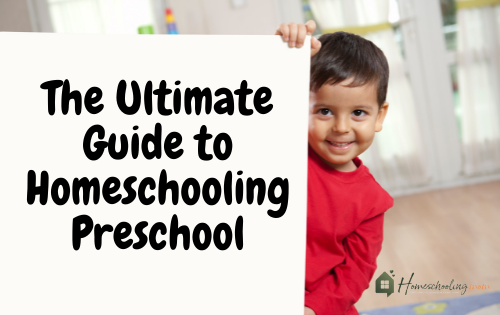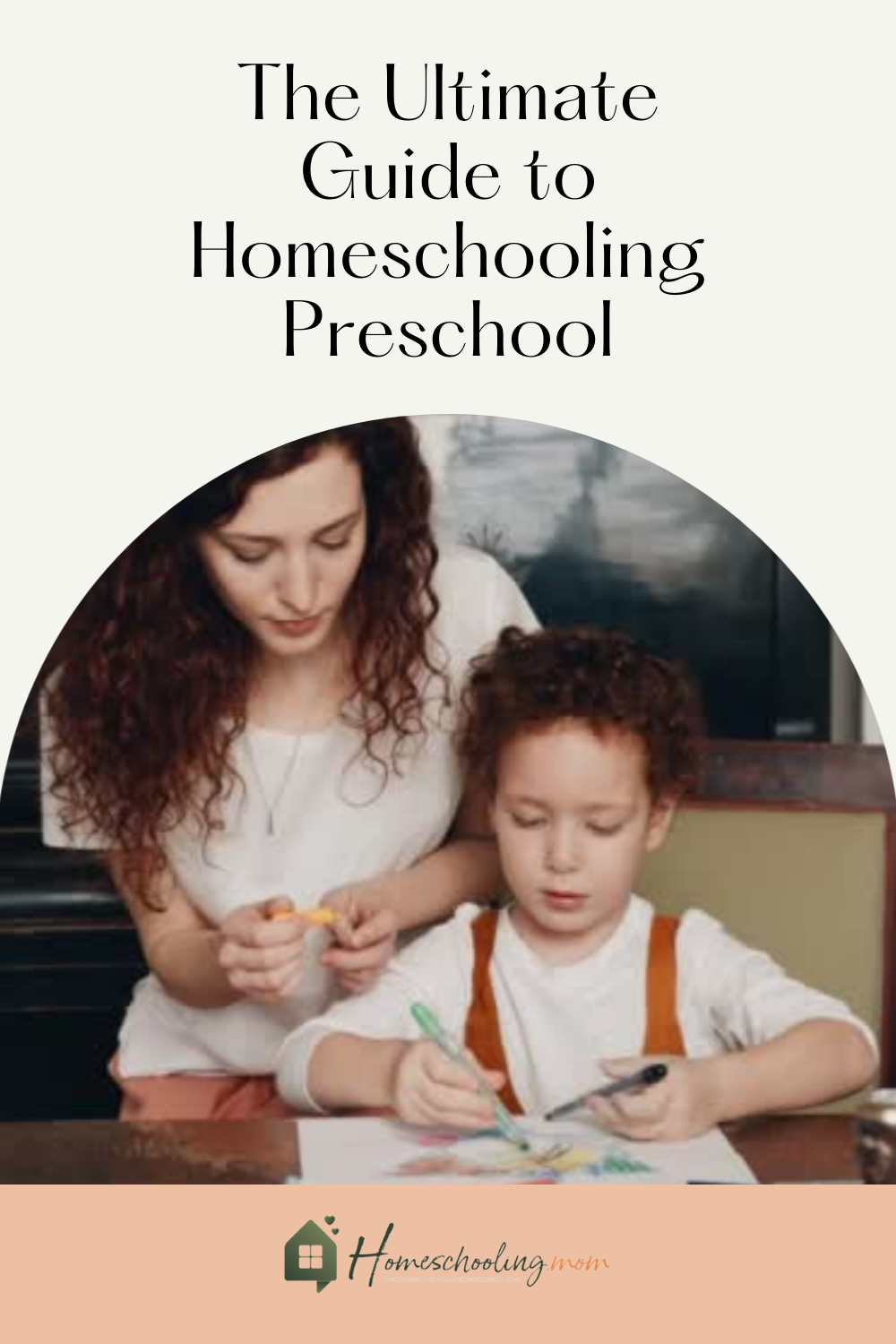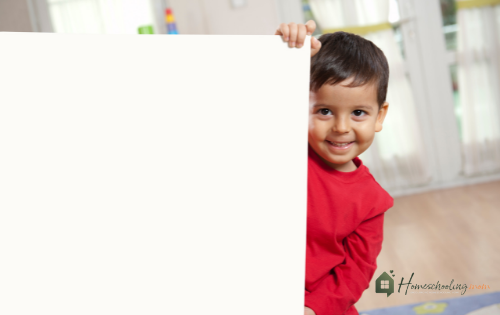The Ultimate Guide to Homeschooling Preschool
If you’ve found yourself homeschooling preschool, then you’ve obviously decided to homeschool right from the start. So, first: congratulations! You’ve taken an excellent first step in your child’s academic future. Homeschooling preschool is a fun and exciting way to create a great foundation upon which to build a love of learning for the years to come.
Many first-time homeschoolers have lots of questions at this particular homeschooling stage, and that’s normal. But the truth is, preschool is simply a continuation of what your child has already been learning, which turns into a bridge to the love of learning. Chances are, you’ve already worked with your little one in speech, learning that words mean things, names of body parts, favorite toys, and colors, as well as how to dress themselves. As you think back on how naturally those things were learned, you’ll have a great foundation on which to build as you venture into preschool.

Homeschooling Preschool: To Homeschool or Not?
Not everyone agrees that homeschooling must start at the preschool stage. Many parents believe preschool to be the brainchild of an overreaching public school system. On the other hand, some believe it to be a great opportunity to add bits of structured learning in a way that will create a love of learning as Kindergarten and first grade quickly approach.
There are no laws, currently, mandating preschool. However, if you decide to do so, most parents begin between the ages of 3 year olds and 4 year olds. It’s a perfect time to create the learning structure, get a feel for lesson plans, as well as your day, and keep track of records or portfolios, depending on the legal requirements for your home state. If you don’t know what those are, you can find out by CLICKING HERE.
First Things First
Embarking on the PreK journey should never be a stressful event. Instead of centering your focus on the structure of formal homeschooling, plan – first and foremost – to have fun by learning through play. Playtime is at the heart of young children, as it should be, and weaving learning into that natural tendency can be a great way to help them start to love learning in the early years. Integrating learning activities into that play is really quite simple. Children’s educational television and video have been doing that for years, with great success.
It won’t take long for you to realize that your children are actually quite eager to learn in a fun, action-packed environment, and, in preschool activities, you can set up “centers” for specific learning endeavors. For instance, create a science area with an aquarium or a water or sand table. You might even include an age-appropriate microscope for added depth. A social studies center could simply be a trunk filled with dress-up clothes to simulate various cultures, surrounded by discussion, videos, or music. For families with mixed-ethnicity parents or adopted children, this can be especially beneficial, especially if you want the child to have a solid grasp of their lineage and background.
Even your own backyard can be one center, all to itself. You can certainly start nature studies and Nature Notebooks at this early age. Your child might not yet be able to formulate words or sentences, but they can draw pictures, cut pictures from magazines to paste in, or even attach leaves or flowers to the pages in remembrance of their adventures. The possibilities are literally limitless.
All of these fun activities will lead to the preschool years fostering a fun learning environment.
What Subjects Should You Teach When Homeschooling Preschool?
Since you’re only just getting started, homeschooling preschool doesn’t usually consist of subjects or a formal preschool curriculum. However, here are a few things you might want to consider including in your preschool homeschool day:
- Family Devotion Time – Spending time together in the Word, especially as the first activity of the day, is always the best way to begin. Not only does this get you all off on the right foot, but it instills in your child the knowledge that the Word is the most important thing of all. “The fear of the LORD is the beginning of wisdom: and the knowledge of the holy is understanding.” Proverbs 9:10
- Math Skills– One of the most necessary things for a child to learn, preschool math is very simple and should contain more words than numbers. That means teaching by explanation to establish a foundation on which to add future mathematical elements. Number recognition would be foundational here, as well.
- Calendar Time – Take a few minutes each morning to discuss the day of the week, the month, and the year, as well as “dailies” such as the weather, “yesterday”, and “tomorrow”.
- Logical Thinking – At this stage, teaching logical thinking needn’t be complex. In fact, the simpler, the better, allowing the child to grasp ideas with a sense of calm.
- Phonics – Pre-reading skills such as learning letter sounds is absolutely essential as a foundational aspect in education. No matter what the child learns or what they aspire to be in life, this is one of the most crucial elements of the academic endeavor.
- Shapes and colors – These two subjects can easily be combined and there are vast activities that include them. Coloring books or apps are a great way to get started, as are board games or videos.
- Reading – This is probably one of the subjects your child will look forward to the most. To them, it’s a great time of not only hearing a really great story and seeing some beautiful artwork in the picture books you use, but it’s also a wonderful time of bonding and creating memories that will last a lifetime. And sometimes, that’s the most important thing. This can also be a good place to introduce the ABCs, including the difference between lowercase letters and uppercase letters and having a letter of the week.
However you set up your schedule, remember that preschool only lasts about half a day, even in the public school setting. It’s best not to overload your child, but rather to give them something to look forward to and seek out.
“Best Practices” for Homeschooling Preschool
There are lots of ways to homeschool preschool and yours will likely be much different than someone else’s. That’s one of the great beauties of being able to homeschool. You get to create a structure and an educational plan that caters to your child’s strengths and character while assuring enough guidance that they do not feel as if their learning environment is out of control. However, there are some basics that seem to work well for everyone, and I’d like to share a few of those with you now.
Homeschooling curriculum, just like homeschooling itself, is not mandated at this early age. There are resources available, most of them very good, so it’s worth looking into. It can help you get a feel for how much guidance and planning you’ll need to create a homeschooling day or week or month, etc. Some parents find that they have more peace if they have things planned out strategically, and others find greater freedom in allowing the day to flow, having just a general idea about topics they’d like to cover. It won’t take long for you to find out which works best for you and your family.
Creating structure and consistency is always a great place to start in the PreK stage. Of course, the relaxed method works great during this year, but if homeschooling is the plan, they should understand that educational activities will happen at specific times each day. It helps them – and you – to get into the routine of learning and helps to create excitement each day.
It's very important to remember that learning can happen anywhere. Taking a walk, playing in the yard, reading good books, or even relaxing on the couch can all be excellent places for discovery, discussion, and imagination. Making the most of moments like these adds to the idea that learning is natural, fun, and always relevant. Even “sick days” can yield a lesson or two, provided the child is not too sick for conversation.
To hone fine motor skills for things like writing, you can have the child help set the table, silverware placement included, build with Play-Doh, or any activity that requires fine detail. It’s quite likely they’ll make many mistakes, but it’s all a part of the learning process at this early age and worth the extra time it takes to fix them.
Under no circumstances should you try to compare your homeschool with someone else’s. It’s definitely tempting, especially as you try to figure out your own path, but it’s more detrimental than helpful. After all, learning your own speed, style, and methods are all a part of creating a homeschooling experience that is unique to your own family.
Try not to spend too much time on any one particular academic skill. If something is working out perfectly, you’re tempted to continue, since the progress is so great. On the other hand, if things aren't working out well, it’s just as tempting to push on to try to drive the lesson home before stopping. In reality, about ten to fifteen minutes per educational activity is enough for one sitting. After that amount of time, take a break and do something else entirely. You’ll be surprised how much better this method works.
A private and dedicated homeschool room is by no means necessary. It can be convenient if you have space, but if you don’t, there’s no reason to stress out about not having a “school room”. Many families who live in small spaces tend to do just as well by dedicating a specific space in their home to educational activities. They also create a space where they can store all their supplies, which might even be a large mobile tote for learning “on the go”.
Read, read, and READ some more! At this age, you can never read too much. In fact, at this age, many children absolutely relish the opportunity to cuddle up on the couch with you as you read them their favorite book. You can point out the words as you read them to help develop pre-reading skills with sight-based learning. If the book contains nursery rhymes, all the better, and if songs, then sing them aloud to make it even more fun.

In Closing
Homeschooling preschool can be a wonderful experience for both parent and child, especially if there’s no stress involved. It’s tempting to try to dive right into everything all at once, trying to see just how far their little minds can actually go, but I implore you to resist that temptation. This year is a time to teach them the love of learning more than anything else. After all, it's a process that truly comes naturally to every child!
No matter what subjects you choose, whether you choose a prepackaged curriculum or not, or whether you choose to dedicate a whole room to the preschool adventure, just keep the basics in mind. Keep it fun. Keep it simple. And keep it going.









Stacey Wells
Stacey is an author, blogger, and former homeschool mother who loves to encourage and uplift, especially on the subjects of faith and homeschooling. She lives in Central Kentucky with her husband, Jimmy, and their two children. For more information, visit her website, Words From The Wheel.